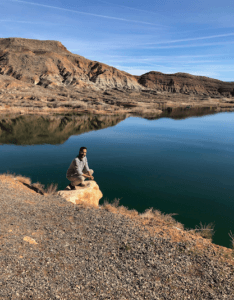Eco-Anxiety: A Call to Action to Address the Mental Health Implications of Climate Change
Do you find yourself experiencing anxiety, grief, or fear around climate change?
Well, this is not unusual. Researchers from ecoAmerica have found that most Americans are concerned about climate change (75%) according to their recent “American Climate Perspective Survey 2022, Volume 1” report. Not only does climate change have a profound impact on the environment(s) we call home, but it is a psychological burden for the communities that face its impacts every day.
In recent years, young environmental activists have coined the term “eco-anxiety” to describe a form of anxiety that is caused by a changing climate, but what does this actually mean? The American Psychological Associate & ecoAmerica has defined eco-anxiety as “a chronic fear of environmental doom”.2 While the physical extent of climate change can easily be seen, there are less visible psychological and mental health impacts such as increased stress or depression that can occur due to the environment changing around us as well.
“Eco-anxiety” is a term that we can use to describe the existential dread that many of us feel when experiencing the destructive nature of climate change such as extreme weather, loss of biodiversity, and environmental changes in our local communities and how it impacts one’s’ mental health. This is all compounded by the lack of meaningful action by our government to stop the impacts of climate change.
Now that we have introduced and defined what eco-anxiety is, let’s discuss the reasoning behind eco-anxiety and its impact on both physical and mental health.
Eco-anxiety or a “chronic fear of environmental doom” can potentially lead to various mental health impacts and anguish around the future of your family, friends, and community. Individuals that experience an extreme climatic event, such as a hurricane, may present with trauma-like symptoms including anxiety, grief, or shock. These symptoms are a result of pathological changes and emotional responses that occur within the body when a person is faced with a threat. Similarly, local communities that are impacted by these events can have a collective emotional response to an acute or prolonged event (such as a drought) that present over a longer period of time.
Clayton & Karazsia (2020) designed a measure to look for the clinical impact of climate change concerns on individuals’ sleep and intrusive thoughts. The researchers found that between 5-9% of the survey group “often” or “almost always” experienced symptoms. Ogunbode et al., 2021 found that “negative emotions about climate change have also been found to be negatively correlated with self-rated mental health in many countries”. As anxiety and stress compound over time, this can lead to increased levels of adrenaline and cortisol, which can result in a variety of cardiovascular and other health issues, additionally impacting one’s mental health. Thus, these physical health implications coupled with inadequate access to clinical and mental health services may lead to an exacerbation of eco-anxiety, and so needed services should be provided for this growing population.
Why does eco-anxiety matter for public health professionals?
Public health practitioners (PHP) have a unique opportunity to lessen eco-anxiety for both individuals and communities through climate and mental-health-focused initiatives. Gone unaddressed, eco-anxiety and ecological grief “may pose or amplify risk factors for mental disorders”.
Fortunately, the interdisciplinary nature of public health offers opportunities for PHPs to consult with psychologists to develop climate-focused interventions for individuals and communities alike who are faced with impacts of climate change. Working alongside mental health practitioners, PHPs can help develop and evaluate strategies to reduce the mental health risks associated with eco-anxiety and ecological losses through their community-focused projects.
This may include educating younger individuals on the mental health impacts of climate change, as well as, connecting individuals with local mental health practitioners and other social services available in their communities to build a sense of connectivity and support. It is also important to mention that individuals that are experiencing the symptoms of eco-anxiety are encouraged to get involved and take action in their local community, which can help with these feelings.
As the environment around us changes, not only is it time to address the physical consequences of climate change but also the psychological and mental health impacts that come along with it.


About the Author
Ajay is a Program Associate within the Emergency Preparedness, Response, and Recovery program. He supports key programmatic work in EPRR projects including Project Firstline, an infection prevention and control initiative, the Coaching for Enhanced Disease Intervention Skills program, and other environmental health projects.
Ajay’s passion for public health began in high school when he joined his local volunteer EMS agency and discovered emergency preparedness and response. His goal to protect families and communities alike from natural and man-made disasters has guided him to advocate for improved climate change adaptation and mitigation research and projects.
Ajay holds his master’s degree in public health with a concentration in Environmental and Occupational Health from the George Washington University in Washington, D.C. His graduate thesis focused on assessing the impact that wildfire smoke may have on climate change and its implications. Prior to joining NNPHI, Ajay was an Emergency Medical Technician and telecommunications operator at the George Washington University Department of Emergency Medicine.